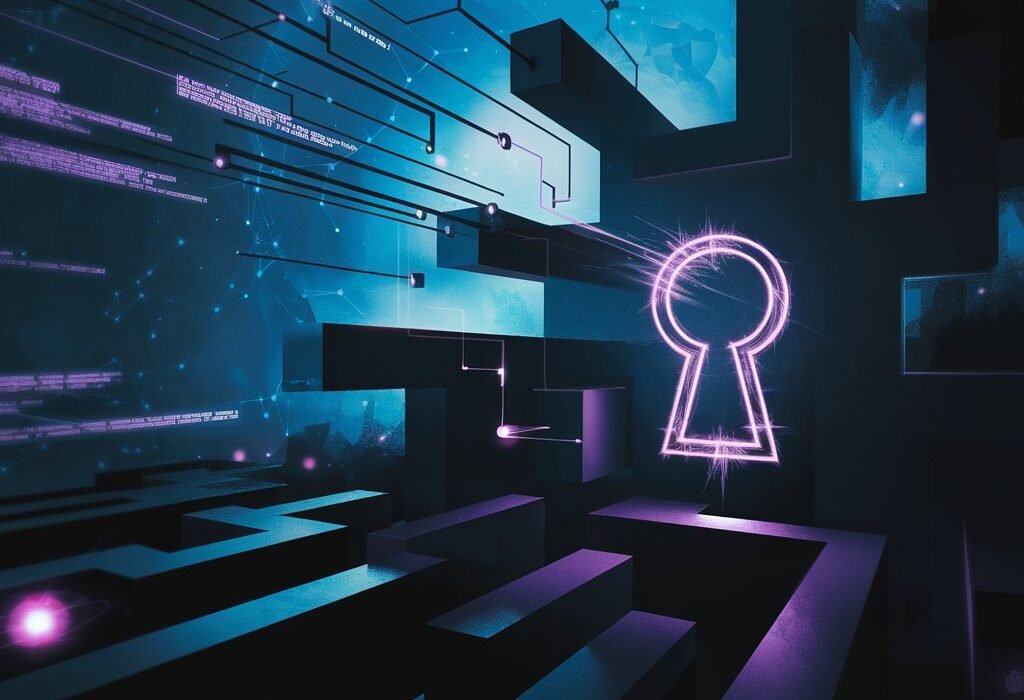The internet consists of two distinct parts. Firstly, there’s the surface web, which we can access through search engines. It encompasses all the websites that are publicly available. Secondly, there’s the deep web, which is not indexed by search engines and includes various types of content such as private databases and internal networks. Within the depths of the deep web lies an even more obscure realm known as the dark web. In this blog post, we will explore both the deep web and its darker counterpart, discussing their nature and emphasizing why they should not be underestimated.
What is the Deep Web?
The Deep Web comprises the hidden portion of the internet, inaccessible through regular Google searches. It is estimated to be 500 times larger than the surface web and intended for restricted access. This concealed realm encompasses private databases, email servers, academic resources, and internal networks owned by private companies. Exploring this vast expanse demands specialized tools or software since it cannot be accessed simply through search engines like Google.
What is the Dark Web?
The dark web is a component of the Deep Web which requires specialized software for access. It is renowned for its anonymity, making it an ideal platform for individuals seeking to purchase illegal items like drugs, weapons, and counterfeit passports. Consequently, this prevalence has resulted in a surge in cybercrime as criminals find convenience in procuring hazardous materials from the dark web. Such accessibility offers an alarming threat to society as it facilitates undetected criminal activities.
How to Access the Dark Web
It is generally advisable to steer clear of the dark web. However, should the need arise for accessing it, following these steps would be prudent:
- To access the dark web, individuals are required to download and install Tor Browser. This software is both popular and secure as it ensures anonymity by concealing one’s IP address and safeguarding their internet activities.
- To access only “.onion” sites, it is recommended to utilize Tor. It’s important to avoid visiting regular websites while using Tor as doing so can increase your vulnerability to identity theft, tracking, or fraudulent phishing attempts.
In the realm of the dark web, it is imperative to maintain a healthy dose of skepticism. Numerous scams lurk in its shadows, posing significant risks to your finances and personal information. Prior to making any investments or sharing sensitive details, exercise utmost caution. Remember, if something appears too good to be true, chances are that it is indeed too good to be true.
The dangers of using the Dark Web
The dark web provides anonymity that enables cybercriminals to engage in illegal activities without the fear of being apprehended. Some common unlawful practices thriving in this realm include drug trafficking, human smuggling, dissemination of child pornography, and hacking activities.
People who venture into the dark web expose themselves to various risks, including the infiltration of viruses and malware on their devices. These malicious programs have the ability to cause significant harm, ranging from device damage to unauthorized access and theft of personal information. Furthermore, these compromised devices can be weaponized for launching cyber attacks against unsuspecting individuals.
Risks and Concerns
Cybercrime and Fraud:
The Dark Web serves as an online platform where illicit transactions take place. It enables individuals to engage in the buying and selling of stolen data, such as credit card numbers and passwords. Consequently, this puts both individuals and companies at a significant risk of falling victim to hacking attempts. In turn, their personal information becomes vulnerable to identity theft or other criminal activities, possibly leading them into grave harm.
Illegal Marketplaces:
The Dark Web represents a concealed sector of the internet, serving as a marketplace for illicit goods such as drugs, weapons, counterfeit items, and other illegal activities. Individuals often utilize these platforms to evade law enforcement officials who diligently pursue those involved in criminal actions within this digital realm.
Privacy and Surveillance:
The Dark Web offers a certain level of privacy, but it may not always guarantee safety. Government agencies and cybersecurity experts are continuously monitoring the platform for criminal activities, making everyone susceptible to cybercrime, including regular individuals like yourself.
Carefulness is crucial when navigating the online realm, as your security may remain vulnerable regardless of your virtual whereabouts. Furthermore, even those who participate in the dark web should be wary of potential hackers attempting to deceive or extract valuable information from them.
Ethical implications and controversies
Freedom of Speech vs. Criminal Activities:
The topic of the Dark Web raises contentious debates. On one hand, it offers an escape for individuals living under oppressive regimes, granting them a chance at freedom. However, it also attracts those with malicious intent, utilizing its veil of anonymity for illicit activities. This situation prompts concerns regarding the ethical responsibility of technology platforms and law enforcement agencies to strike a balance between preserving privacy and ensuring security.
Unregulated Content and Exploitation:
The Dark Web operates without regulations or oversight, allowing offensive and harmful content to proliferate unhindered. Disturbing materials such as child exploitation and ideologies promoting violence find an easy platform for dissemination. The question of responsibility in addressing these concerns remains unclear, with both technology platforms and law enforcement agencies potentially playing a role.
Staying Safe:
The deep web and particularly the dark web present significant risks for those who access them. Criminals operating within the depths of the dark web may seek to pilfer personal information, infect devices with malicious software, or manipulate unwitting users into engaging in unlawful activities. Consequently, it is highly advisable to steer clear of venturing into this shadowy realm entirely. In the event that you inadvertently stumble upon the dark web or encounter suspicious websites, it becomes paramount to promptly disconnect and report any illicit activity to law enforcement authorities.
To ensure a secure online experience, individuals should follow several important practices. First and foremost, using strong passwords is crucial. Additionally, keeping antivirus software updated and exercising caution when clicking on internet content are vital measures to protect against potential threats. One must also make it a priority to stay informed about emerging dangers and regularly educate themselves on safe internet usage techniques.
Conclusion
In conclusion, the Deep Web and the dark web are distinct aspects of the internet that demand our attention. It is crucial to recognize that while some content on these networks may be legal and appropriate, utilizing them can pose risks. The deep web is not designed for public consumption; instead, it is advisable to stick to easily accessible websites. On the other hand, the dark net presents a societal hazard by enabling individuals to engage in activities outside government intervention or oversight—such as purchasing illicit drugs or weapons. Caution should prevail when venturing into this hidden realm of the internet, ensuring supervision and undertaking necessary precautions beforehand.

